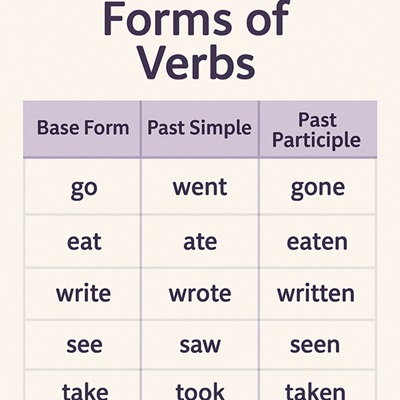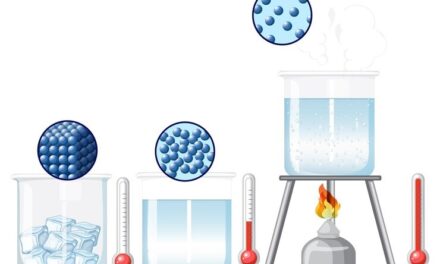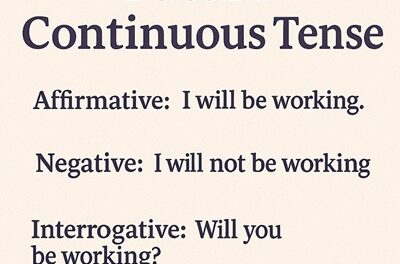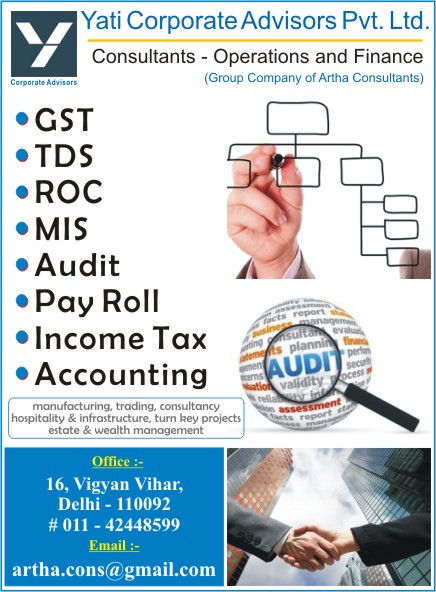Introduction to Verb Tenses in English
English verbs appear in different forms to indicate when an action takes place (present, past, or future) and its aspect (simple, continuous, perfect, or perfect continuous). This guide presents a comprehensive overview of all English tenses, their formation, and their usage with examples.
Simple Tenses
Simple Present
Formation:
- Base form of the verb (infinitive without ‘to’)
- Add -s/-es for third person singular (he/she/it)
Usage:
- Habitual actions or routines
- Example: I walk to work every day.
- Example: She reads books in the evening.
- General truths and facts
- Example: Water boils at 100 degrees Celsius.
- Example: The Earth revolves around the Sun.
- Scheduled future events
- Example: The train leaves at 5 PM tomorrow.
- Example: The semester begins next week.
- Narrative or dramatic present
- Example: In the final scene, the hero defeats the villain and saves the city.
Simple Past
Formation:
- Regular verbs: add -ed to the base form
- Irregular verbs: use second form (see irregular verbs list)
Usage:
- Completed actions in the past
- Example: I walked to the store yesterday.
- Example: She bought a new car last month.
- Past states or conditions
- Example: I was happy in my previous job.
- Example: They lived in Paris for ten years.
- Series of completed actions
- Example: I woke up, took a shower, and had breakfast.
- Habits in the past (often with used to/would)
- Example: When I was a child, I played soccer every weekend.
Simple Future
Formation:
- will + base form of the verb
- be going to + base form of the verb
Usage:
- Predictions about the future
- Example: It will rain tomorrow.
- Example: She is going to succeed in her career.
- Spontaneous decisions
- Example: I’ll help you with that.
- Example: I think I’ll have the chicken.
- Promises or intentions
- Example: I will always support you.
- Example: We’re going to start saving money.
- Scheduled events (often with Simple Present or Present Continuous)
- Example: The plane takes off at 7 PM. (Simple Present)
- Example: We’re meeting the clients next week. (Present Continuous)
Continuous Tenses
Present Continuous
Formation:
- am/is/are + present participle (verb + -ing)
Usage:
- Actions happening at the moment of speaking
- Example: I am writing a letter right now.
- Example: They are playing tennis at the moment.
- Temporary situations
- Example: I am living with my parents until I find an apartment.
- Example: She is working on a big project this month.
- Planned future arrangements
- Example: We are flying to Rome next week.
- Example: I’m having dinner with John tomorrow.
- Developing situations
- Example: The global climate is changing rapidly.
- Example: Your English is improving.
- Annoying habits (with always, constantly, etc.)
- Example: He is always leaving his dirty dishes in the sink.
- Example: They are constantly complaining about the weather.
Past Continuous
Formation:
- was/were + present participle (verb + -ing)
Usage:
- Actions in progress at a specific time in the past
- Example: At 7 PM yesterday, I was having dinner.
- Example: When you called, I was sleeping.
- Background actions (often with Simple Past)
- Example: While I was cooking, the phone rang.
- Example: As she was crossing the street, she saw an old friend.
- Repeated actions in the past that were annoying (with always)
- Example: He was always interrupting me during meetings.
- Example: They were constantly arriving late to class.
Future Continuous
Formation:
- will be + present participle (verb + -ing)
Usage:
- Actions in progress at a specific time in the future
- Example: This time tomorrow, I will be flying to New York.
- Example: At 10 AM, they will be attending a conference.
- Ongoing actions in the future
- Example: For the next two weeks, I’ll be working on this project.
- Example: She’ll be teaching at the university while she’s in town.
- Polite inquiries about someone’s plans
- Example: Will you be using the car tonight?
- Example: Will she be joining us for dinner?
Perfect Tenses
Present Perfect
Formation:
- have/has + past participle (third form of the verb)
Usage:
- Past actions with present results
- Example: I have lost my keys. (So I can’t get into my house now)
- Example: She has broken her leg. (So she can’t walk now)
- Experiences up to the present
- Example: I have visited Paris three times.
- Example: She has never eaten sushi.
- Unfinished time periods
- Example: I have studied English for ten years.
- Example: He has lived in Canada since 2015.
- Recent actions (often with just, already, yet)
- Example: I have just finished my homework.
- Example: Have you eaten dinner yet?
Past Perfect
Formation:
- had + past participle (third form of the verb)
Usage:
- Actions completed before another past action
- Example: When I arrived at the party, Tom had already left.
- Example: By the time she finished college, she had learned three languages.
- Reported speech when the original was in Present Perfect
- Example: She said she had never been to London. (She said: “I have never been to London.”)
- Third conditional clauses
- Example: If I had studied harder, I would have passed the exam.
Future Perfect
Formation:
- will have + past participle (third form of the verb)
Usage:
- Actions that will be completed before a specific time in the future
- Example: By next month, I will have finished my thesis.
- Example: By the time she arrives, we will have prepared everything.
- Duration up to a point in the future
- Example: By December, I will have worked here for ten years.
- Example: By 2030, scientists will have developed new technologies.
Perfect Continuous Tenses
Present Perfect Continuous
Formation:
- have/has been + present participle (verb + -ing)
Usage:
- Actions that started in the past and continue to the present
- Example: I have been waiting for you for two hours.
- Example: She has been learning Japanese since last year.
- Recent continuous activities that have a present result
- Example: I’m tired because I have been running.
- Example: Why are your clothes wet? I have been washing the car.
- Temporary situations up to the present
- Example: He has been living in a hotel while his house is being renovated.
- Example: The company has been losing money for several quarters.
Past Perfect Continuous
Formation:
- had been + present participle (verb + -ing)
Usage:
- Actions that were in progress before another action in the past
- Example: I had been studying for three hours when she called.
- Example: They had been discussing the issue for an hour before the manager arrived.
- Explaining causes of past situations
- Example: I was tired because I had been working all night.
- Example: The ground was wet because it had been raining.
- Duration of an action up to a point in the past
- Example: By the time I graduated, I had been studying English for ten years.
- Example: When they got married, they had been dating for five years.
Future Perfect Continuous
Formation:
- will have been + present participle (verb + -ing)
Usage:
- Actions that will be in progress over a period up to a future time
- Example: By next month, I will have been working here for five years.
- Example: By the time she graduates, she will have been studying medicine for six years.
- Duration and continuity of actions in the future
- Example: At 5 PM, they will have been traveling for 12 hours.
- Example: Next week, we will have been living in this house for a decade.
Common Irregular Verbs
| Base Form | Simple Past | Past Participle |
|---|---|---|
| be | was/were | been |
| begin | began | begun |
| break | broke | broken |
| bring | brought | brought |
| buy | bought | bought |
| catch | caught | caught |
| come | came | come |
| do | did | done |
| drink | drank | drunk |
| drive | drove | driven |
| eat | ate | eaten |
| fall | fell | fallen |
| feel | felt | felt |
| find | found | found |
| fly | flew | flown |
| forget | forgot | forgotten |
| get | got | got/gotten |
| give | gave | given |
| go | went | gone |
| have | had | had |
| hear | heard | heard |
| know | knew | known |
| leave | left | left |
| make | made | made |
| meet | met | met |
| put | put | put |
| read | read | read |
| run | ran | run |
| say | said | said |
| see | saw | seen |
| send | sent | sent |
| sing | sang | sung |
| sit | sat | sat |
| speak | spoke | spoken |
| stand | stood | stood |
| swim | swam | swum |
| take | took | taken |
| teach | taught | taught |
| tell | told | told |
| think | thought | thought |
| wear | wore | worn |
| win | won | won |
| write | wrote | written |
Special Cases and Exceptions
State Verbs
Some verbs are rarely used in continuous tenses because they describe states rather than actions:
- Mental states: believe, understand, know, recognize, remember, forget, doubt, etc.
- Example: I know the answer. (Not: I am knowing the answer)
- Emotions and feelings: love, hate, like, dislike, prefer, want, need, etc.
- Example: I love chocolate. (Not: I am loving chocolate)
- Senses: see, hear, smell, taste, feel, etc.
- Example: I see what you mean. (Not: I am seeing what you mean)
- Possession: have, own, belong, possess, etc.
- Example: She has a beautiful house. (Not: She is having a beautiful house)
However, some of these verbs can be used in continuous tenses with different meanings:
- I think she is right. (opinion/state) vs. I’m thinking about my future. (process)
- This soup tastes delicious. (sense) vs. He is tasting the soup to check if it needs salt. (action)
- She has three cars. (possession) vs. She is having dinner now. (activity)
Future in the Past
Used to express actions that were planned or expected to happen in the future, as viewed from a point in the past.
Formation:
- was/were going to + base form
- would + base form
Usage:
- Planned future actions viewed from the past
- Example: I was going to call you, but I forgot.
- Example: She said she would help us the next day.
- Predictions made in the past
- Example: I knew it would rain yesterday.
- Example: They were sure the team was going to win.
Conditional Tenses
Zero Conditional
- If + present simple, present simple
- Used for general truths and scientific facts
- Example: If you heat ice, it melts.
First Conditional
- If + present simple, will/can/may + base form
- Used for real or possible situations in the future
- Example: If it rains tomorrow, we will stay home.
Second Conditional
- If + past simple, would/could/might + base form
- Used for unreal or hypothetical situations in the present or future
- Example: If I had more money, I would buy a new car.
Third Conditional
- If + past perfect, would/could/might have + past participle
- Used for unreal situations in the past (regrets, hypothetical past)
- Example: If I had studied harder, I would have passed the exam.
Mixed Conditional
- If + past perfect, would/could/might + base form (past condition, present result)
- If + past simple, would/could/might have + past participle (present condition, past result)
- Example: If I had saved money last year (past), I would be able to buy a car now (present).
- Example: If I were more responsible (present), I would have finished the project on time (past).
Practical Tips for Mastering Tenses
- Study each tense individually before trying to understand how they relate to each other.
- Use timelines to visualize the relationship between different tenses.
- Practice with real-life contexts rather than isolated sentences.
- Pay attention to time expressions that are commonly used with each tense:
- Simple Present: always, usually, often, sometimes, rarely, never, every day/week/month, etc.
- Present Continuous: now, at this moment, right now, currently, etc.
- Simple Past: yesterday, last week, two days ago, in 2010, when I was young, etc.
- Past Continuous: while, when, as, at this time yesterday, etc.
- Present Perfect: just, already, yet, ever, never, for, since, so far, etc.
- Present Perfect Continuous: for, since, all day, lately, recently, etc.
- Remember that context determines the tense more than rigid rules.
- Read extensively in English to internalize how native speakers use tenses naturally.
- Keep a journal in English to practice using different tenses to describe your daily life and experiences.
This guide covers the fundamentals of English verb tenses. Remember that language is fluid, and native speakers often use tenses in ways that might occasionally seem to break the “rules.” With practice and exposure to authentic English, you’ll develop an intuitive understanding of how and when to use each tense appropriately.

















